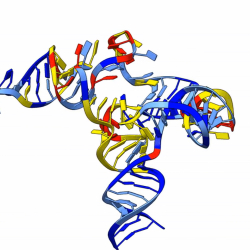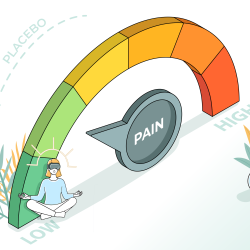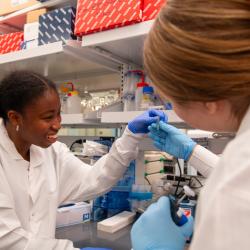UMB’s David Weber Appointed Professor of Chemistry and Biochemistry at UMCP and Interim Co-director of IBBR
David Weber joined the faculty of the University of Maryland, College Park (UMCP) on September 1, 2020, as a professor in the Department of Chemistry and Biochemistry and interim co-director of the Institute for Bioscience and Biotechnology Research (IBBR).
He will maintain a primary appointment on the faculty of the University of Maryland, Baltimore (UMB) as a professor in the University of Maryland School of Medicine’s (UMSOM) Department of Biochemistry and Molecular Biology and as director of the Center for Biomolecular Therapeutics (CBT).
“We are delighted that Professor Weber is joining our college,” said Amitabh Varshney, dean of UMCP’s College of Computer, Mathematical, and Natural Sciences (CMNS). “We look forward to working with him to strengthen the collaboration with our colleagues at the School of Medicine who are advancing research into human health, disease and therapies.”
In his personal research, Weber studies mechanism involved in disease states and drug development to target those mechanisms. Since 1993, Weber has directed the CBT, where he was the principle investigator of a $7.9 million federal grant to acquire a superconducting 950-megahertz nuclear magnetic resonance magnet that is helping researchers throughout the University System of Maryland (USM) better understand large protein complexes and other biomolecules and to develop new agents to treat cancer, AIDS and other diseases
“I have been working with several faculty members in the chemistry and biochemistry department collaboratively for many years and look forward to continuing such collaborations in structural biology and biophysics,” Weber said. “This includes basic science questions involving biomolecular interactions that are highly relevant to therapeutic development.”
Since 2011, Weber has served as associate director of IBBR, which is a unique collaboration between UMCP, UMB, and the National Institute of Standards and Technology that breaks down traditional silos between academia, government and industry to advance pioneering research and development in medicine, biosciences, technology, quantitative sciences and engineering.
In his role at IBBR, Weber was instrumental in developing IBBR’s cryo-electron microscopy (cryo-EM) capabilities. He serves as director of the cryo-EM facilities, which provide a critical set of tools for structural biology research. Technological breakthroughs in cryo-EM have revolutionized the field of structural biology, which seeks to understand the structure and dynamics of biological molecule and are helping to inform the design of small molecule drugs, biotherapeutics and vaccines.
“David Weber is a highly accomplished biophysical chemist with a research program centered on structural biology of biomedically important proteins and protein complexes,” said UMCP Department of Chemistry and Biochemistry Chair Janice Reutt-Robey. “His joining our department will provide new training opportunities, help us to grow our cryo-electron microscopy capabilities and create new opportunities for advancing our research into impactful directions.”
At UMSOM, Weber served as director of graduate education for the joint program in biochemistry and molecular biology from 2001 to 2011. He is an editorial member of more than 10 journals and has authored more than 150 research articles and book chapters involving basic science and biomedical therapeutics advances.
Weber earned his bachelor’s degree in chemistry at Muhlenberg College in 1984 and his Ph.D. in chemistry at the University of North Carolina at Chapel Hill in 1988.
###
Writer: Kimbra Cutlip
Media Relations Contact: Abby Robinson, 301-405-5845, abbyr@umd.edu
University of Maryland
College of Computer, Mathematical, and Natural Sciences
2300 Symons Hall
College Park, Md. 20742
www.cmns.umd.edu
@UMDscience
About the College of Computer, Mathematical, and Natural Sciences
The College of Computer, Mathematical, and Natural Sciences at the University of Maryland educates more than 9,000 future scientific leaders in its undergraduate and graduate programs each year. The college's 10 departments and more than a dozen interdisciplinary research centers foster scientific discovery with annual sponsored research funding exceeding $200 million.







